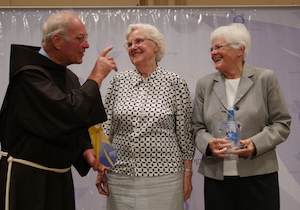| |
|
 |
PRESS RELEASE: Society for Conservation Biology gives inaugural Assisi Award for faith-based conservation
July 23, 2017:
This inaugural award for faith-based conservation, given by the Society for Conservation Biology, is named after the historic 1986 ARC-WWF meeting of religions and conservationists at Assisi, Italy, when these issues were discussed formally between these groups for the very first time.
ARC is thrilled the first award went to the innovative Holy Wisdom Benedictine Monastery in Middleton, Wisconsin, which has made ecology its mission for a long time, and we are also excited that the Society has decided that drawing up guidelines for working with faiths is a priority at their 28th International Congress.
PRESS RELEASE: Society for Conservation Biology gives inaugural Assisi Award for faith-based conservation23 July 2017: Society for Conservation Biology’s 28th International Congress for Conservation Biology ICCB 2017: “Insights for Sustaining Life on Earth”
Cartagena, Colombia
Holy Wisdom Monastery of Middleton, Wisconsin, USA, received the inaugural Assisi Award at the 28th International Congress of Conservation Biology’s Opening Ceremony Sunday night in Cartagena, Colombia.
 |
 |
 |
Nuns at the Holy Wisdom Monastery of Middleton, Wisconsin, USA, received the inaugural Assisi Award for their extraordinary work to protect the natural world |
The Assisi Award acknowledges organizations and individuals whose work demonstrates that faith-based conservation is contributing significantly to the common global effort of conserving life on Earth.
Fabrizio Frascaroli, RCBWG president, said, “The Religion and Conservation Biology Working Group of the Society for Conservation Biology is truly delighted to present this award in Cartagena, in front of a diverse audience of conservation scientists, indigenous representatives and policy-makers.”
The Holy Wisdom Monastery is an ecumenical Benedictine community located near Madison, Wisconsin, with a mission to weave prayer, hospitality, justice and care for the earth into a shared way of life. Their community setting includes restored prairie, a retreat and guest house and a ‘green’ monastery building.
Sister Mary David Walgenbach, prioress of Holy Wisdom Monastery, said, “The Sisters and the women and men who support the Holy Wisdom Monastery are deeply honored to receive the Assisi Award.
The Sisters and Holy Wisdom Monastery inherit the 1500 year-old Benedictine tradition of caring for creation. This heritage is lived today in collaboration with environmentalists and scientists in our building the highest rated LEED (Leadership in Energy and Environmental Design) Platinum certified building in the United States. Our Wisdom Prairie Project improves the water quality of Madison lakes, streams and wetlands.”
The name of the Assisi Award celebrates a historic 1986 meeting where leaders of all major world religions made public declarations to protect the environment. The meeting was an initiative of His Royal Highness The Duke of Edinburgh, President of WWF International at the time.
The town of Assisi was chosen as the meeting site due to its connection to St. Francis, a saint ecumenically admired and also respected by non-Christians in virtue of his reverence for nature and close bond with the natural world.
The Assisi Award recognizes conservation initiatives around the world led by faith leaders from world religions and indigenous peoples. Frascaroli said, “We hope the award will highlight how the drive to protect the biosphere is not the prerogative of a single philosophy, but rather stems from a variety of worldviews, values and knowledge systems.”
Holy Wisdom Monastery was not the only religious entity to be acknowledged at the opening ceremony of ICCB. A Franciscan missionary, Fr. Hermann Borg, received the SCB Distinguished Service Award for his exemplary work in showcasing the true meaning of Stewardship, by planting one million trees for forest conservation and community empowerment in Kenya.
The importance of faith-based approaches to conservation is gaining recognition. On Monday, June 19th, religious and indigenous leaders from 21 countries convened in Oslo for the Interfaith Rainforest Initiative, supported by Norway’s King Harald V. Last September, the International Union for the Conservation of Nature (IUCN) World Conservation Congress (WCC) passed Resolution 33, which stated that “effective and equitable approaches to the design, governance and management of protected or conserved areas need to be grounded not only in science but also in cultures, religions, worldviews and co-existing customary practices relating to nature.”
Frascaroli noted, “We sincerely appreciate the current efforts of the conservation world and SCB in particular towards building a more inclusive, pluralistic and democratic conservation community.”
At the ICCB, the RCBWG is hosting a symposium and workshop for its Best Practices Project, compiling a set of guidelines and best practices to support scientists to hone communication and successfully work with faith groups.
ICCB sessions relevant to faiths and conservation can be found on the RCBWG website.
|
 |
 |
|
|
|
|
|

